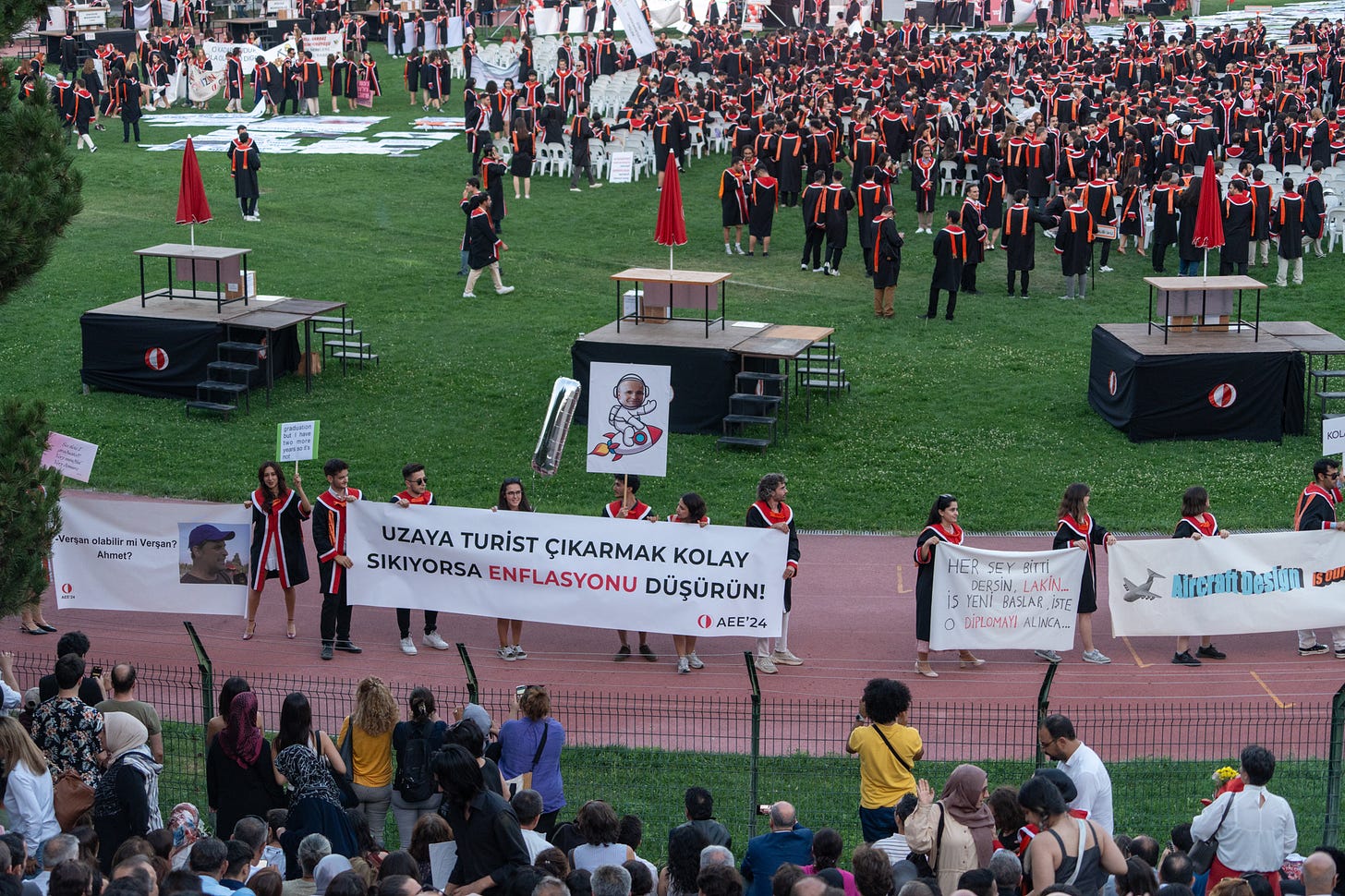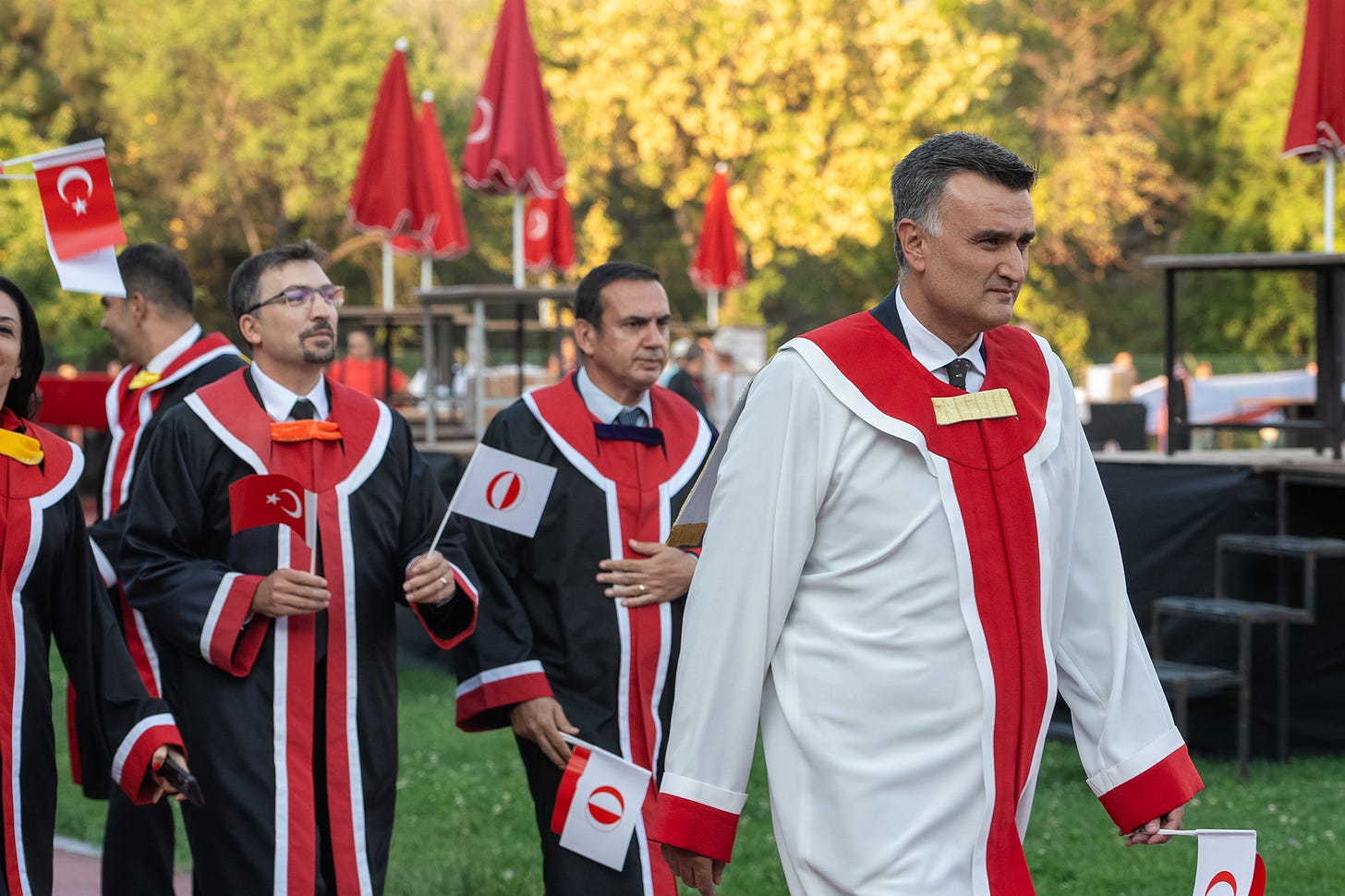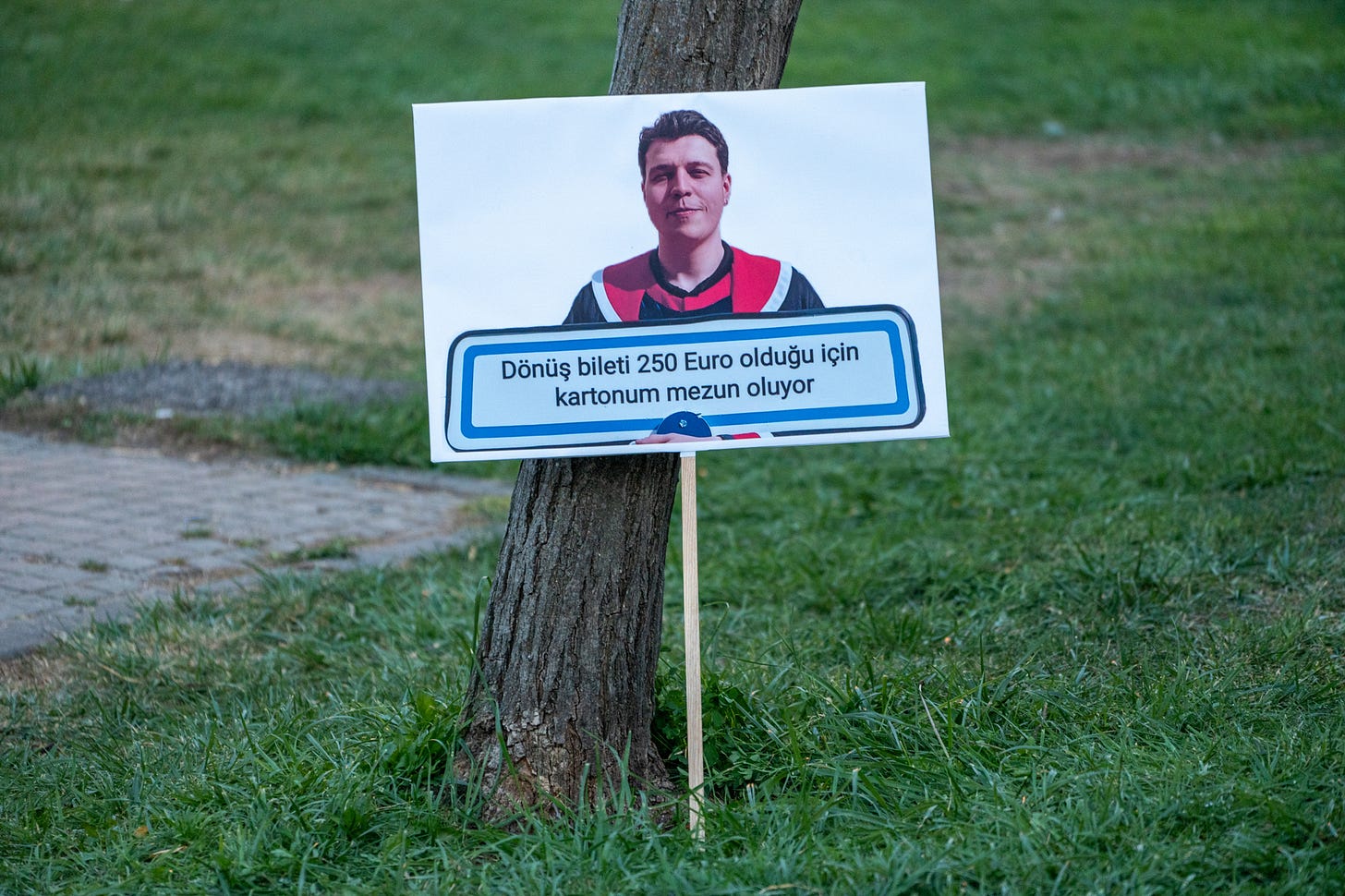Graduation turned protest: METU students challenge government influence in higher education

ANKARA – Devrim Stadium is packed when the marching band starts playing on an early September afternoon in Ankara. One by one, graduates from Middle East Technical University (METU, or ODTÜ in Turkish) walk a lap of honor on the athletic track in their black, white and red gowns.
“Devrim” means “revolution” in Turkish, a testament to a history of leftist activism at METU, one of Turkey’s top state universities. Against this backdrop, the school’s annual graduation ceremony is not only a moment to celebrate, but also an opportunity to protest for most students.
Graduates carry banners with creative jokes, memes or political messages as they circle the stadium. Between rainbow colors and Palestinian flags, many banners criticize the government or the rector of METU.
“It is a tradition for the graduation to talk about everything that we couldn’t talk about during our studies,” said Barış, a graduate in Energy Studies. Together with a group of friends, Barış made a banner criticizing the recent street dog law. For them, the evening is political.
“We are being silenced, so this is a tradition against the oppressive government,” adds Emek, a graduate from the Faculty of Engineering. Both requested to withhold their last name, fearing repercussions for their comments.
METU’s “graduation protest” is a response to a culture of censorship, a lack of academic independence and the general state of the economy, all of which have deteriorated under the Justice and Development Party (AKP) government.
And while students push back in Devrim Stadium today, many are considering opportunities abroad tomorrow.
Rector appointments
Most of the anger at this year’s graduation was directed at the newly appointed rector, Ahmet Yozgatlıgil, who students see as illegitimate due to his appointment by presidential decree.
Pres. Recep Tayyip Erdoğan began appointing rectors by decree in 2016. Although there is a long history of top-down state involvement in higher education, university elections were abolished in 2016.
In June this year, Turkey’s Constitutional Court ruled such appointments by decree were unconstitutional and gave the government one year to draft new legislation.
The ruling prompted the European University Association to call on Turkish authorities to reconsider appointments, stating: “No other European system allows the head of state or government to directly select and appoint rectors.”
Yet in August, Erdoğan appointed 13 new rectors, including Yozgatlıgil at METU. Yozgatlıgil has a long academic career at METU, but was serving as a deputy minister at the Ministry of Science, Industry and Technology before he was appointed as head of METU.
Students did not give him a warm welcome. At the graduation ceremony, banners criticizing Yozgatlıgil’s appointment were met with applause. “Kayyum is not brat”, was written on one sign, with the green design of Charli XCX album.
During his speech that evening, Yozgatlıgil was booed and some of the attendees turned their back to the rector. His address ended abruptly due to an apparent power outage, which was received with applause.
Campus culture
Not only is an unelected rector problematic in principle, said Hamza Ramazan Arslan, a graduate in Urban Planning, it also has real consequences on campus.
“The rector became someone that is unreachable, while it should be someone that should be in touch with us,” Arslan told Turkey recap.
During the term of Verşan Kök, the previous rector appointed by Erdoğan in 2016, Pride marches on campus were banned and met with police violence. In contrast, students this year managed to hold a Pride protest.
“[METU] is one of the few educational environments in Ankara, in Turkey, with a campus where me and my friends feel free and safe. I can describe it best as home,” Arslan added.
Top university
As a state university, METU hosts a more diverse student population than expensive private universities. Still, the political messaging on the graduation banners is less diverse.
“I have never seen a pro-AKP banner,” said Kadir Coşkun, who is responsible for the printing of the banners. “I’m sure there are some supporters, there are more than 26,000 students, but they are not being very open about it.”
Coşkun graduated three years ago from the Industrial Engineering department and is still actively involved with campus parties and festivals. He works remotely for an American company, stating he believed Turkish companies did not offer sufficient career advancement opportunities.
“You can earn progress, but only in title, but you do not earn skills in the current system,” Coşkun told Turkey recap, mostly criticizing the lack of meritocracy.
He continued, estimating at least half of his fellow graduates did not work for Turkish companies.
“They are either working remotely or already left the country. It is a great loss because we all used the resources of this country throughout the years, but we do not contribute to the Turkish economy,” Coşkun said.
Most of the other interviewed graduates also said they had plans to pursue master’s degrees abroad.
AKP-campuses
Amid the criticism, Erdoğan sees himself as a champion of higher education in Turkey.
“By increasing the number of universities from 76 to 208, we paved the way for every young person to attend higher education in the nearest place to their homes. We facilitated the spread of knowledge, culture and science to all our 81 provinces through our universities,” the president said during the opening of the 2023/2024 academic year.
Most of the 132 universities opened by the AKP in the last two decades are located in smaller towns. For her book titled Provincial Universities: AK Party’s Back Campus, journalist Tuğba Tekerek visited five such campuses, in Giresun, Ağrı, Bingöl, Kilis and Yalova.
Her reporting found a lack of qualified academics in many of the faculties, a general low quality of education and disappointed students.
“When establishing these universities, the primary goal was not to give good quality education to young people, nor to provide a good research environment for academics,” Tekerek told Turkey recap. “The universities in provincial cities are mostly used as political instruments for the AK Party.”
Still, many academics recognize increasing the number of universities has made higher education more accessible for students from low-income families or women from conservative families, who did not have the means or permission from their families to move far from their hometowns.
Yet, the value of diplomas from new universities are a subject of constant debate in Turkey.
Apart from a difference in quality, there is also a difference in campus atmosphere, said Tekerek, who is a graduate of Boğaziçi University, another top school in Turkey. She noted that despite recent rector appointments and attempts to quell campus activism, students still raise their voices at top schools.
“Since the AK Party couldn’t take existing universities under control 15 years ago, it opened new universities in provincial cities,” Tekerek said, adding: “The AK Party keeps these campuses under close control. In this way, they prevent any form of opposition on campuses.”
In one such campus, Caner Yıldırım graduated this year as a software engineer from Yalova University, and experienced difficulties in organizing social activities as head of the university film club.
“We wanted to organize an open air cinema night. You are asking for equipment from the department, but they don’t even respond. They just try to discourage you by making you wait,” he told Turkey recap.
Yıldırım said he suspected the delay was a reaction to some LGBT-related activities his club had organized, but he added he heard other clubs experienced similar problems. Although Yıldırım was happy he graduated, he claimed the university was sub-standard.
“I think I received one of the worst educations possible,” he said, adding: “Teachers were definitely quite inadequate both in terms of explanation and their own knowledge.”
The contested quality of new universities negatively affects students, but also casts a shadow on the reputation of Turkish academia, in general.
“When you see someone from X university or X professor, right now you always have to question whether that is a real university or real academic,” academic Can Candan told Turkey recap.
Boğaziçi University
Along with METU, Istanbul’s Boğaziçi University is another top school that does not fit within the government ideals of a university culture. Boğaziçi has been led by government-appointed rectors since 2016 and large protests hit the campus in 2021.
One of the academics speaking out against the rector and the appointment is Can Candan, a documentary maker and lecturer in the history of documentary cinema. He currently is in a judicial battle with Boğaziçi over his dismissal.
“It is clear in our constitution that universities are autonomous institutions, they need to be free from political power,” Candan told Turkey recap.
Government interference in universities is not something that only happened in the AKP era, military coups and the headscarf ban were also a threat to academic freedom, Candan added.
Candan said he does not believe the AKP will succeed in getting students and universities completely in line with their beliefs.
“We are in 2024, there are lots of young people who know that they deserve better because they're more open to the world. It's not like the 1980s where we had one-channel state television.”
He sees the student protests against government interference on campus as “an inspiration” and “a source of hope”.
Yet at the METU graduation, most students are not optimistic about their (academic) career in Turkey.
“We have the feeling we do not get what we deserve in Turkey,” Ebru said, a graduate in Psychology, who was part of the group with the street dog banner.
Among this group of graduates, none wanted to pursue a career in Turkey, citing general cronyism and the demanding working culture of Turkish companies as their reasons.
But over the long term, they see their future in their homeland.
“I don’t think anyone will go abroad to stay there. But we need a stabilized Turkey to come back,” Barış said.
The rector offices of METU and Boğaziçi did not respond to requests for comment for this report.
This newsletter is supported by readers via Substack and Patreon. Paid subscribers get full access to our recaps, reports, members-only chat and news tracking tools. All proceeds go towards sustaining our journalism.
Turkey recap is produced by the Kolektif Medya Derneği (KMD), an İstanbul-based non-profit association founded by our editorial team to support and elevate news media and journalists in Turkey. Contact us: info@turkeyrecap.com
Diego Cupolo, Editor-in-chief @diegocupolo
Gonca Tokyol, Editor-at-large @goncatokyol
Ingrid Woudwijk, KMD president @deingrid
Verda Uyar, Digital growth manager @verdauyar
Emily Johnson, Deputy editor @emilyjohnson
Damla Uğantaş, Tr Türkçe editor @damlaugantas
Azra Ceylan, Economy reporter @azraceylani








